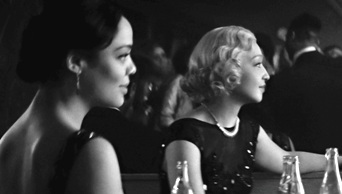
The classic Harlem Renaissance novel by Ella Larsen about the American delusion of race is beautifully adapted by Rebecca Hall.
Passing is a remarkable film about what we used to call the color line, the distinction between races that has permeated American history. It is the debut of Rebecca Hall as director and writer, a gifted actress now going behind the camera. Passing is adapted by Hall from the famous 1929 novel of the same name by Nella Larsen, an important writer in what has come to be called The Harlem Renaissance.
In midtown Manhattan, sometime in the 1920s, Irene, a young woman played by Tessa Thompson, furtively enters a fancy hotel, lowering her hat to help conceal her face. Only later do we realize that she’s “passing,” on a small scale just in this part of town. “Passing” was when people of color who were light-skinned enough, managed to successfully pretend being white. Irene wouldn’t normally be allowed in this hotel. She lives in Harlem, married with two kids.
While enjoying a refreshment, she’s startled to see someone she knows from her younger days in Chicago—Clare, played by Ruth Negga, laughing and having casual conversations with some white friends. Clare sees Irene, approaches her with affection and invites her to her hotel room for some drinks. Clare has blonde hair and is a good deal lighter skinned than Irene, and after they go up to the room, she reveals that she’s totally passing for white in every part of her life, including having a white husband,, and a daughter. We can see that all this produces wonderment in the mind of Irene at her old friend’s audacity. Then Clare’s husband shows up, astonishingly addressing his wife as “Nig” which he explains is a joke because Clare seems to have gotten darker after the birth of their child. Actually, he says, he hates Negroes, and neither he nor Clare will go near them. Thus begins a suspenseful exploration of the complex structure of racism in the Jim Crow era, which by the way, affected black Americans throughout the country, not just in the South.
Nowadays it’s just part of life to see people, and actually be people, that look like Irene or Clare, and in general we use the word multiracial. But back then, even if the only person of color in your family tree was a great grandparent, you were to be legally considered a Negro. The racist beliefs of the time meant that one drop of so-called black blood took away your white privileges. I imagine that one of the reasons Rebecca Hall shot this film in black and white is that it makes it easier for a modern audience to believe that Thompson and Negga’s characters could pass. And besides the metaphorical angle of “black and white,” it’s an opportunity to depict a deeper character study, because black and white photography makes everything seem more subjective, and Hall is mainly interested in the inner drama of what the characters are feeling and thinking.
In fact, our point of view character is Tessa Thompson’s Irene. The film shows us almost everything that happens through her eyes. When Clare expresses regret at leaving the black community, and starts to visit Irene in Harlem, the uncertainty Clare represents, along with her risky breaking of boundaries, make Irene feel insecure. She desperately wants to believe that her position is not threatened, that her family is safe, and that she can live separately from white society without worry. But Irene’s fear comes up to the surface anyway, in the form of jealousy. She is in for a shock.
Thompson, Negga, and all the supporting cast are great. The pacing is just right. Passing is a film of rare sensibility—a subtle and nuanced drama of American illusions.

Greta Gerwig’s beautiful new adaptation of the classic Louisa May Alcott novel plays with the book’s time sequence in order to emphasize the March...

A film about the leader of The Shakers, an 18th century religious group, uses songs and dancing to portray the fervent spiritual forces at...

Fritz Lang adapted the medieval German epic into this awe-inspiring two part spectacle, one of the great achievements of the silent film era. After...